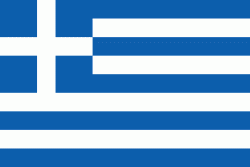Kilkis Prefecture (Nomós Kilkís)
The geography of the regional unit of Kilkis is characterized by the wide and flat Axios river valley in the westcentral part, and mountain ranges on its western and northeastern edges. The mountain range in the west, on the border with Pella regional unit, is Mount Paiko (highest peak 1650 m). In the north, the Kerkini range straddles the border with North Macedonia. At 1874 m the highest peak in Kilkis regional unit is located here. The border with Serres regional unit to the northeast is formed by the lower Kroussia range (highest peak 1179 m). Lake Doirani is situated in the north, shared with North Macedonia. Kilkis borders the Thessaloniki regional unit to the south.
The climate of the Kilkis regional unit is humid continental in the north, and humid subtropical in the lower regions.
Map - Kilkis Prefecture (Nomós Kilkís)
Map
Country - Greece
 |
 |
| Flag of Greece | |
Greece is considered the cradle of Western civilization, being the birthplace of democracy, Western philosophy, Western literature, historiography, political science, major scientific and mathematical principles, theatre and the Olympic Games. From the eighth century BC, the Greeks were organised into various independent city-states, known as poleis (singular polis), which spanned the Mediterranean and the Black Sea. Philip II of Macedon united most of present-day Greece in the fourth century BC, with his son Alexander the Great rapidly conquering much of the ancient world, from the eastern Mediterranean to the North Western parts of India. The subsequent Hellenistic period saw the height of Greek culture and influence in antiquity. Greece was annexed by Rome in the second century BC, becoming an integral part of the Roman Empire and its continuation, the Byzantine Empire, which was culturally and linguistically predominantly Greek.
Currency / Language
| ISO | Currency | Symbol | Significant figures |
|---|---|---|---|
| EUR | Euro | € | 2 |
| ISO | Language |
|---|---|
| EN | English language |
| FR | French language |
| EL | Greek language |















